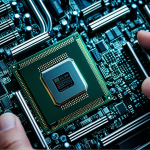UK Computing Hardware Foundations for Augmented Reality
The UK computing hardware sector plays a crucial role in underpinning the growth of AR technology foundations. Core components like advanced processors, high-resolution sensors, and specialized memory units form the backbone of augmented reality systems. These allow devices to process complex real-time data and deliver immersive user experiences.
The British technology sector boasts strong capabilities in precision engineering and semiconductor manufacturing, essential for producing reliable and efficient hardware. UK firms excel in crafting components that balance performance with energy efficiency, a critical factor for wearable AR devices that require lightweight and long-lasting power supplies.
Also to read : How Does Computing Hardware Influence UK Business Productivity?
Moreover, hardware-software integration is a key strength in UK AR development. Seamless coordination between AR hardware components and software platforms ensures optimal performance, minimizing latency and maximizing responsiveness. British companies often develop custom chipsets tailored specifically for AR applications, reinforcing the synergy between hardware design and AR software frameworks.
This integrated approach positions the UK as a leader in building foundational hardware, driving forward the practical deployment and continual innovation of augmented reality technologies.
Also read : How does UK computing hardware address the needs of cybersecurity?
UK Computing Hardware Foundations for Augmented Reality
Understanding UK computing hardware is crucial to appreciating its role in the development of AR technology foundations. At the core of AR advancements lie several key hardware components: high-performance processors, advanced sensors, and precision optics. The UK’s strengths are evident in both hardware engineering and manufacturing, where established firms and startups alike contribute innovative solutions that drive AR forward.
British technology sector players excel in creating components that seamlessly merge with software platforms, enabling smooth hardware-software integration essential for robust AR experiences. The UK’s heritage in semiconductor design and manufacturing provides a stable base for producing custom chips tailored to AR’s unique demands, such as low latency and high energy efficiency.
Moreover, UK engineers focus on developing sensors capable of tracking motion and environment accurately, a fundamental need for AR devices to render immersive visuals accurately. By integrating these hardware elements with cutting-edge software, the UK tech ecosystem fosters AR solutions that not only push technological boundaries but also maintain practical usability and energy efficiency. This integration underscores the UK’s pivotal role in the global AR hardware landscape.
Innovative Hardware Contributions by UK Firms and Institutions
British technology sector leaders are at the forefront of UK hardware innovations in augmented reality. Prominent firms such as Imagination Technologies and ARM Holdings have developed specialized processors and custom chipsets optimized for AR applications, addressing demands for low latency and high energy efficiency.
Research institutions play a crucial role as well. Universities including Cambridge and Imperial College London collaborate closely with industry to advance AR hardware capabilities. Their joint projects focus on sensor accuracy, miniaturization, and enhanced optics, essential for immersive AR experiences. This synergy accelerates innovation cycles, ensuring rapid translation from research to usable tech.
Notable projects include the development of ultra-low power processors tailored for wearable AR devices and advanced motion-tracking sensors enabling precise environmental mapping. These UK-led innovations directly contribute to the global AR industry, showcasing the country’s strength in integrating cutting-edge research with commercial hardware solutions.
The collaboration between academia and industry fuels the British technology sector’s lead in AR hardware development, fostering an environment where new technologies emerge efficiently and effectively, strengthening the UK’s position as an AR industry leader.
Technological Advancements Enabling AR in the UK
The British R&D sector drives significant AR hardware advancements, focusing on processing power, sensors, and optics tailored for immersive experiences. UK firms develop next-generation processors that deliver high computational speeds while maintaining energy efficiency, a balance crucial for wearable AR devices requiring long battery life without sacrificing performance.
Custom chipsets constitute a core part of these advancements. British firms design these chipsets to optimize data handling and minimize latency, directly enhancing real-time interaction quality in AR applications. This customization also supports hardware-software integration, ensuring seamless communication between components and AR platforms.
Sensor technology in the UK has progressed to enable precise environmental mapping and motion tracking. Enhanced optics designed by British engineers improve visual clarity and depth perception, intensifying the immersive experience. Together, these advancements position the UK as a leader in setting global standards for AR hardware, influencing design protocols and performance benchmarks worldwide.
Through sustained innovation, the British technology sector not only advances hardware capabilities but also shapes the future landscape of next-generation AR technology, underlining its vital role in global AR hardware development and deployment.
Technological Advancements Enabling AR in the UK
British R&D continues to push the boundaries of AR hardware advancements, focusing on improving processing power, sensor technology, and optics. UK firms have developed custom chipsets that optimize computational efficiency, crucial for wearable AR devices requiring high performance with low energy consumption. These chipsets reduce latency and boost responsiveness, enhancing user experience in real time.
Sensor innovations from the British technology sector include ultra-precise motion tracking and environmental mapping capabilities. These advancements enable AR devices to interact with physical spaces confidently, which is vital for applications demanding accuracy, such as industrial maintenance or medical visualization.
Energy-efficient designs are another cornerstone of UK AR hardware advancements. By integrating low-power processors and advanced sensor arrays, UK companies extend battery life without compromising device weight or usability. This is particularly significant for wearable AR technology, where comfort and prolonged use are critical.
Through intensive British R&D, these innovations set new benchmarks in AR hardware. The UK’s leadership in designing next-generation AR technology not only supports domestic industry growth but also influences global AR hardware standards, reflecting the country’s pivotal role in the evolving AR landscape.
UK Computing Hardware Foundations for Augmented Reality
The UK computing hardware sector underpins the rapid growth of AR technology foundations by delivering essential components like high-performance processors, advanced sensors, and precision optics. These components enable real-time data processing and accurate environmental mapping, critical for immersive AR experiences.
Britain’s hardware engineering excels in combining energy-efficient designs with powerful computing capabilities. The British technology sector benefits from a concentration of semiconductor manufacturing expertise, supporting the creation of custom chipsets tailored for AR’s demanding low-latency and high-reliability needs. This bespoke hardware ensures wearable AR devices are lightweight yet powerful, addressing the balance between performance and portability.
Hardware-software integration is pivotal in the UK, with firms optimizing communication between physical components and AR platforms. This coordination reduces latency, enhances responsiveness, and supports robust AR applications across industries. By focusing on these strengths, the UK computing hardware ecosystem establishes a strong foundation for ongoing AR innovation and practical deployment.










